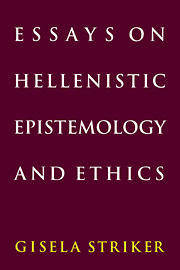Book contents
- Frontmatter
- Contents
- Preface
- Acknowledgments and essay sources
- List of abbreviations: Frequently cited names and titles
- EPISTEMOLOGY
- ETHICS
- 8 Greek ethics and moral theory
- 9 Ataraxia: Happiness as tranquillity
- 10 Epicurean hedonism
- 11 Origins of the concept of natural law
- 12 Following nature: A study in Stoic ethics
- 13 The role of oikeiōsis in Stoic ethics
- 14 Antipater, or the art of living
- 15 Plato's Socrates and the Stoics
- Name index
- Index of passages cited
14 - Antipater, or the art of living
Published online by Cambridge University Press: 05 June 2012
- Frontmatter
- Contents
- Preface
- Acknowledgments and essay sources
- List of abbreviations: Frequently cited names and titles
- EPISTEMOLOGY
- ETHICS
- 8 Greek ethics and moral theory
- 9 Ataraxia: Happiness as tranquillity
- 10 Epicurean hedonism
- 11 Origins of the concept of natural law
- 12 Following nature: A study in Stoic ethics
- 13 The role of oikeiōsis in Stoic ethics
- 14 Antipater, or the art of living
- 15 Plato's Socrates and the Stoics
- Name index
- Index of passages cited
Summary
In reading the doxographical reports on Stoic philosophy, one gets the impression that the Stoics had a singular, and often irritating, predilection for identity-statements. The best known case is undoubtedly that of nature, which is at the same time reason, fatum, providence and Zeus himself (Plut Stoic, rep. 1050b). But in ethics, too, one finds such series of identifications, which do not always make understanding the texts any easier. The goal of life, for example, eudaimonia, is supposed to consist in a life in agreement with nature, which is ostensibly the same as a life in accordance with virtue. And this in turn seems to be a life which is determined by the rational selection of that which accords with nature. Virtue, for its part, is designated as a ‘consistent attitude’ (diathesis homologoumenē, D.L. VII 89), as ‘knowledge of what is good, bad and neither of these’ (S.E. M XI 170, 184), and finally as ‘the art of living’ (technē peri ton bion, ibid., 170, 181, 184). These claims are not at all self-evident, and hence obviously require justification. But the explanations are mosdy omitted, or merely hinted at by the doxographers, so that part of the task of interpretation, a part unfortunately sometimes neglected, consists in finding the justifications.
As long as one does not know how an identity-statement is justified, one can hardly judge arguments in which it appears.
- Type
- Chapter
- Information
- Essays on Hellenistic Epistemology and Ethics , pp. 298 - 315Publisher: Cambridge University PressPrint publication year: 1996
- 6
- Cited by



